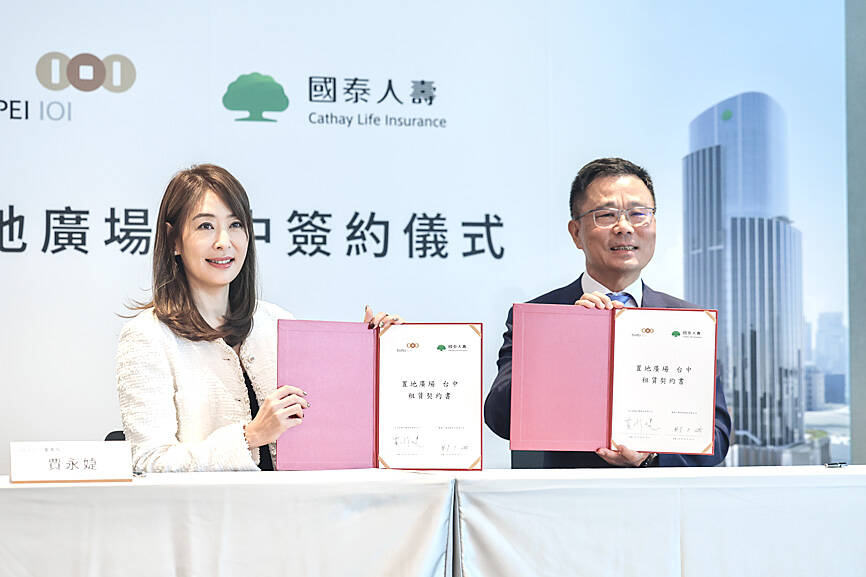Taipei 101 operator Taipei Financial Center Corp (台北金融大樓) and Cathay Life Insurance Co (國泰人壽) yesterday signed an agreement to jointly enter the Taichung real-estate market with a new development project named Landmark Taichung (置地廣場台中).
The proposed building, which has 34 floors above ground and seven basement floors, would be built on a site near Taichung MRT City Hall Station, with total floor area of about 155,000m2 — including 115,000m2 of commercial space and 40,000m2 for parking lots, Taipei Financial said in a statement.
There would be a shopping mall spanning from the building’s B1 to seventh floor, designed to offer “innovative” retail experiences and “diverse” lifestyle options for consumers, the statement said.

Photo: CNA
The construction of the green building is expected to be completed in 2029, it said.
“Through this partnership, we hope to bring Taipei 101’s years of accumulated success to Taichung and create a new landmark that reflects a global vision and local culture,” Taipei Financial chairwoman Janet Chia (賈永婕) said in the statement.
“We aim to bring together refined, stylish, fun and unique brands to create a shopping destination that meets the needs of Taichung’s consumers and delivers a distinctive retail experience,” Taipei Financial president Julie Chu (朱麗文) said.
The Landmark Taichung is expected to open for operations in 2030, with an initial investment of NT$4.5 billion (US$136.2 million), Chia said.
Taipei Financial would operate the building via a 20-year lease with Cathay Life, she said.
It is expected to break even in about seven years, she added.
Cathay Life president Andrew Liu (劉上旗) said the collaboration would bring long-term and stable investment value to the company.

STEEP DECLINE: Yesterday’s drop was the third-steepest in its history, the steepest being Monday’s drop in the wake of the tariff announcement on Wednesday last week Taiwanese stocks continued their heavy sell-off yesterday, as concerns over US tariffs and unwinding of leveraged bets weighed on the market. The benchmark TAIEX plunged 1,068.19 points, or 5.79 percent, to 17,391.76, notching the biggest drop among Asian peers as it hit a 15-month low. The decline came even after the government on late Tuesday authorized the NT$500 billion (US$15.2 billion) National Stabilization Fund (國安基金) to step in to buoy the market amid investors’ worries over tariffs imposed by US President Donald Trump. Yesterday’s decline was the third-steepest in its history, trailing only the declines of 2,065.87 points on Monday and

TAKING STOCK: A Taiwanese cookware firm in Vietnam urged customers to assess inventory or place orders early so shipments can reach the US while tariffs are paused Taiwanese businesses in Vietnam are exploring alternatives after the White House imposed a 46 percent import duty on Vietnamese goods, following US President Donald Trump’s announcement of “reciprocal” tariffs on the US’ trading partners. Lo Shih-liang (羅世良), chairman of Brico Industry Co (裕茂工業), a Taiwanese company that manufactures cast iron cookware and stove components in Vietnam, said that more than 40 percent of his business was tied to the US market, describing the constant US policy shifts as an emotional roller coaster. “I work during the day and stay up all night watching the news. I’ve been following US news until 3am

Six years ago, LVMH’s billionaire CEO Bernard Arnault and US President Donald Trump cut the blue ribbon on a factory in rural Texas that would make designer handbags for Louis Vuitton, one of the world’s best-known luxury brands. However, since the high-profile opening, the factory has faced a host of problems limiting production, 11 former Louis Vuitton employees said. The site has consistently ranked among the worst-performing for Louis Vuitton globally, “significantly” underperforming other facilities, said three former Louis Vuitton workers and a senior industry source, who cited internal rankings shared with staff. The plant’s problems — which have not

TARIFF CONCERNS: The chipmaker cited global uncertainty from US tariffs and a weakening economic outlook, but said its Singapore expansion remains on track Vanguard International Semiconductor Corp (世界先進), a foundry service provider specializing in producing power management and display driver chips, yesterday withdrew its full-year revenue projection of moderate growth for this year, as escalating US tariff tensions raised uncertainty and concern about a potential economic recession. The Hsinchu-based chipmaker in February said revenues this year would grow mildly from last year based on improving supply chain inventory levels and market demand. At the time, it also anticipated gradual quarter revenue growth. However, the US’ sweeping tariff policy has upended the industry’s supply chains and weakened economic prospects for the world economy, it said. “Now